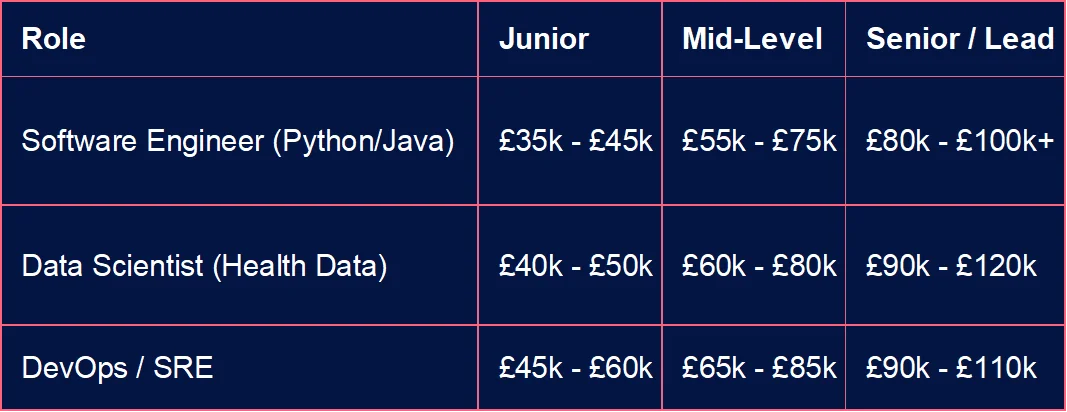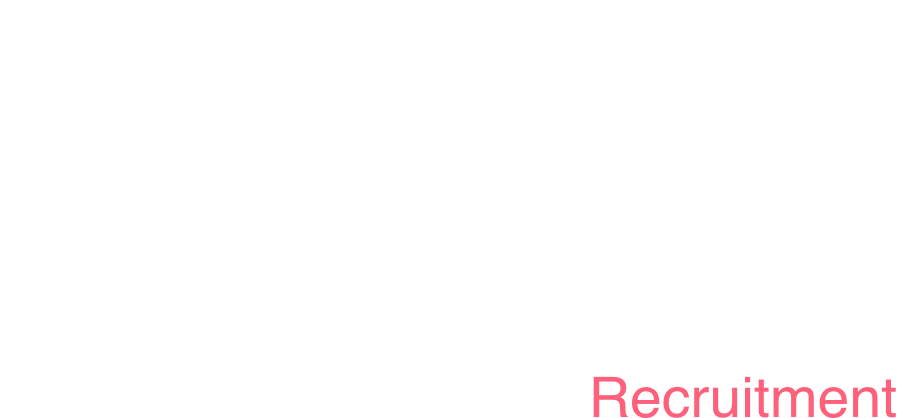Why HealthTech & MedTech Are Winning the Battle for Top Tech Talent (HealthTech Recruitment Trends)
27 Nov, 20256 minutesHealthTech and MedTech sectors are securing top talent by offering a "triple threat" value p...

HealthTech and MedTech sectors are securing top talent by offering a "triple threat" value proposition: recession-proof stability, competitive salaries that now rival Fintech (with senior engineers averaging £75k–£90k+), and the opportunity to do mission-driven work using cutting-edge AI and IoT technologies.
The "Great Resignation" has evolved into the "Great Re-Evaluation."
For years, Fintech and SaaS giants held the monopoly on top-tier engineering talent in the UK. They offered the highest salaries, the shiniest offices in London and Manchester, and the most modern tech stacks. But, the tide is turning slightly
We are seeing a massive migration of Senior Software Engineers, Data Scientists, and Product Managers leaving traditional high-growth sectors for HealthTech and MedTech.
Why? Because writing code to optimise ad clicks or shave milliseconds off a high-frequency trade is no longer enough. Today’s talent wants purpose without a pay cut.
At Talego (the dedicated Tech-for-Good division of MRJ Recruitment), we see this daily. Here is why HealthTech is winning the war for talent, and how hiring managers can leverage this to build world-class teams.
1. The "Purpose Pivot": Coding for Cures, Not Clicks
The number one driver we see in HealthTech recruitment trends this year is the desire for tangible impact.
In a post-pandemic world, candidates are asking: "Does my code matter?"
- Fintech: Optimises wealth for the 1%.
- AdTech: Optimises attention spans.
- HealthTech: Optimises patient outcomes, early diagnostics, and mental health accessibility.
For a Python developer, the day-to-day work might look similar, building pipelines, managing APIs, wrangling data, but the outcome is radically different. Working on a platform that uses Computer Vision to detect early-stage tumors offers a level of job satisfaction that a neo-bank simply cannot match.
Talego Insight: We recently placed a Lead Data Engineer who took a lateral salary move from a Tier-1 Bank to a Manchester-based HealthTech scale-up. Her reasoning? "I want my kids to know that my work helps people get better, not just gets them into debt."
2. The Tech Stack is No Longer "Legacy"
A common misconception is that healthcare IT is stuck in the dark ages of on-premise servers and Windows 95. While that may still plague parts of the public sector, the private HealthTech and MedTech space is bleeding-edge.
If you are hiring developers, you need to highlight your stack. The sector is currently driving innovation in:
- AI & Machine Learning: Diagnostic algorithms and predictive analytics.
- IoT & Wearables: Remote patient monitoring (RPM) devices.
- Rust & Python: For high-performance, secure medical device software.
- Blockchain: For immutable, secure patient data records.
Candidates are realising that MedTech isn't just about maintenance; it's about greenfield development in a highly complex, interesting domain.
3. Salaries: Closing the Gap with Fintech
Historically, you paid a "passion tax" to work in healthcare. That is effectively dead.
With venture capital pouring into digital health (despite a general market slowdown), MedTech software engineer salaries have surged.
Market Snapshot (UK Average):

Source: Aggregated market data from MRJ Recruitment placements and 2025 industry reports.
When you combine these figures with the stability of the healthcare sector, which is less prone to the volatile layoffs seen in pure-play SaaS, the total compensation package becomes incredibly attractive.
4. The Talego Edge: Finding the "Hybrid" Talent
For our clients, the challenge isn't just finding a good coder; it's finding a good coder who understands compliance.
In 2025, the "Holy Grail" candidate possesses:
- Technical Excellence: Top 1% engineering skills.
- Regulatory Awareness: Understanding of ISO 13485, IEC 62304, or GDPR/HIPAA.
Hiring managers often struggle here. If you reject every candidate who doesn't already have MedTech experience, your talent pool shrinks to zero.
The Solution? Hire for technical aptitude and cultural mission-fit, then train for compliance. It is easier to teach a brilliant React developer about FDA guidelines than it is to teach a regulatory expert how to build a scalable front-end.
Need to Scale Your Engineering Team?
We know that finding developers who "get" the mission is hard. At MRJ, we don't just match keywords; we match purpose.
5. Retention: It’s More Than Just Fruit Baskets
Tech talent retention strategies have moved beyond office perks. In HealthTech, retention is driven by:
- Direct Access to Clinicians: Engineers love solving problems. Let them speak directly to the doctors using their software. It bridges the gap between code and cure.
- Ethics & Governance: Tech talent is increasingly wary of "black box" AI. HealthTech offers a regulated environment where ethical coding is a requirement, not an afterthought.
- Hybrid Flexibility: While hospitals run 24/7, the dev team doesn't have to. The best MedTech firms offer full remote or hybrid flexibility, competing directly with pure-tech companies.
FAQ: HealthTech Recruitment
Why is hiring for HealthTech harder than other sectors?
It requires a "dual-literacy." Candidates need high-level technical skills but must also possess the patience for rigorous testing, documentation, and regulatory hurdles (like FDA/MDR approval) that don't exist in unregulated SaaS environments.
What are the most in-demand technical skills in MedTech?
Currently, Python (for data and backend), Rust (for safety-critical device software), and React Native (for patient-facing apps) are the top three. Demand for NLP (Natural Language Processing) specialists to handle unstructured clinical notes is also skyrocketing.
Do developers take a pay cut to move into HealthTech?
Not anymore. While Fintech at the very top end (Hedge Funds) still pays the absolute maximum, HealthTech has caught up with general Tech/SaaS salaries. The gap has closed significantly, especially for Senior and Lead roles.
How can startups compete with big pharma for talent?
Startups offer agility and equity. Big Pharma can be slow and bureaucratic. Top engineers often prefer a Series A/B HealthTech startup where they can own the product roadmap and see their code go live in months, not years.
Your Next Step: Mastering HealthTech Hiring
The battle for talent is fierce, but HealthTech has the ultimate ace up its sleeve: Meaning.
If you are a hiring manager, stop selling just the "stack" and start selling the "save." If you are a candidate, look for the companies that value your craft and your conscience.
Ready to win the talent battle?
- Audit your Job Specs: Do they mention ISO standards in the first line? Move them to the "Desirable" section to widen your pool.
- Highlight the Impact: Ensure your careers page tells the story of the patient, not just the product.
- Partner with Specialists: Generalist recruiters often miss the nuance of MedTech compliance.
Author Bio
Lauren is a Content Specialist at MRJ Recruitment & Talego. With a deep focus on the intersection of technology and human potential, Lauren specialises in decoding recruitment trends for high-growth sectors. She helps clients navigate the complexities of the tech talent market, ensuring they attract engineers who are as passionate about the mission as they are about the code.




